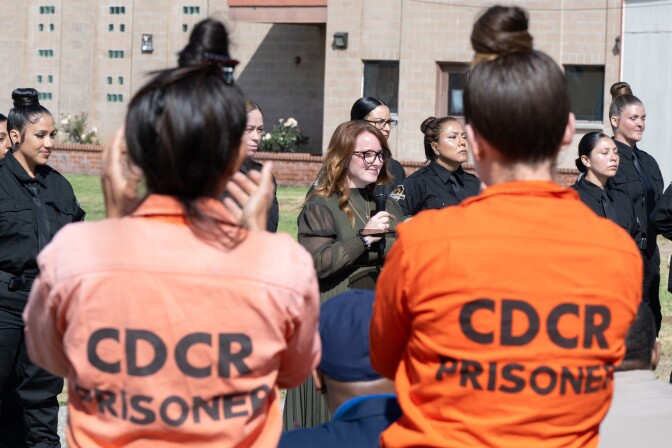A Los Angeles County program that trains formerly incarcerated people for firefighting careers recently launched its first all-female cohort.
Seventeen women are participating in the job training program, which will certify them to work in fire service jobs while providing on-site room and board, as well as support services.
The group held an open house Monday at the Los Angeles County Training Center in Calabasas, where these cadets will live and train for the next eight months.
Laquisha Johnson, who began her training last month, said she’s grateful for the camaraderie.
“It is a male-dominated field, so it's good that it is an all-female cohort because then there's other women who are like-minded,” she told LAist.
County leaders praised the women for taking on a dangerous role.
“These 17 trailblazing Angelenos are not only breaking barriers — they’re setting a new standard for what leadership, grit and public service look like,” L.A. County Supervisor Lindsey Horvath said in a statement.

What is the firefighter training program?
L.A County launched the program last year with two goals in mind: to bolster the county’s fire defenses and to give formerly incarcerated people with firefighting experience more opportunity to work in fire departments.
People held in state prison have been part of California’s firefighting force for more than a century. Over 1,800 incarcerated firefighters currently live in minimum-security conservation camps known as “fire camps” across California, according to the state Department of Corrections and Rehabilitation.
Members of those fire camps help fight wildland fires by clearing brush and cutting fire lines.
“Historically, it's not unusual for individuals to be incarcerated and to essentially fight fires, but there weren't many paths for them to careers after that,” said Songhai Armstead, director of the county’s Justice Care and Opportunities Department.
The training program allows people who have been incarcerated to take their firefighting careers to the next level, county officials said, training and certifying them to fight wildland fires, battle structure fires and perform emergency medical care.
The county helps those who complete the training apply for full-time jobs.
About a dozen cadets graduated from its inaugural, all-male cohort last fall, about half of those who began the training program. All but a few of those graduates are now working for Cal Fire, Armstead said.
The department transformed Camp David Gonzalez, a former juvenile detention facility in Calabasas, into a residential firefighter training center.

Who are the cadets?
The cohort of 17 cadets moved into the training site in March. Most fought fires in fire camps while in custody as adults or juveniles.
In addition to formerly incarcerated people, the program also prioritizes applicants who left foster care or the military. Applicants must be over 18, have no convictions for sex crimes or arson, and pass a physical test and drug test.
Johnson, who said she's in her early 30s, worked as a firefighter more than an decade ago when she was incarcerated as a young adult.
For more than two years, she worked alongside nine other incarcerated women at a fire station in Madera County. More recently, she’s volunteered for Sister Warriors, doing policy advocacy work for incarcerated firefighters.
“I would love to train with men, but I think it's only 9% women actually in the fire service,” said Johnson. “So to have a program like this, we get to show like, ‘Hey, we're interested too, and we want to be a part of it.”
Johnson said her goal is to work on an L.A. County fire engine crew.
Elizabeth Melendez, 45, also has experience fighting fires while incarcerated nearly a decade ago. She saw one of her fellow crew members die during a Malibu brushfire in 2016.
“It's a very dangerous job,” said Melendez. “But still, the life that I was living was dangerous. So me doing this to help and save people, I realized that I still want to do this even if it's risking my life.”
Melendez said she heard about an all-women fire center training cohort and jumped at the opportunity. Her goal is to work for Cal Fire.
“ I wanted something where I could give back to the community as opposed to in my past taking,” she said.
Get involved
The county is accepting applications for next year’s cohort, both men and women. You can find more information online.
Learn more about other resources offered by L.A. County’s Justice Care and Opportunities Department on its website.












